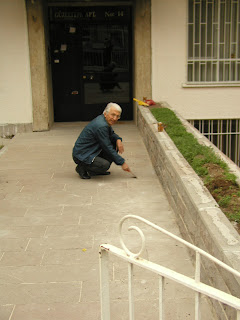On my first trip to Turkey, I became a millionaire in the instant I first changed a few dollars. In 2002 the exchanges rate was about a million to one. Before my next visit in 2004, the government had changed to the New Turkish Lira (Yeni Türk Lirası, YTL) and the millionaire days were gone. This year, trying to sound knowledgeable, I learned to say ‘YTL’ instead of just ‘lira’ and was doing fine until they changed the currency again.
The value stayed the same, but the appearance is quite different and I like it. Unfortunately, there’s the dilemma of what to call it. The old was ‘new’ and the new is now just Turkish Lira, TL, but I still hear ‘YTL’ frequently.

The current currency is quite different: the size increases with increasing value and the color changes as well. Ataturk is on the front, of course, but he’s smiling. Best of all, there are interesting people on the back, not all political.

On the back of the 10 TL is Dr. Cahit Arf, a physicist, along with the mathematical function named for him. On the back of the 50 TL is the female writer Fatma Aliye, who wrote during the War of Independence. There is no 1 TL note. The coins have changed too. The 50 kuruş is particularly nice with the bridge over the Bosporus connecting Europe and Asia.
All in all, I wish the US would take note of the “new” Turkish notes. I understand that we could save millions by not printing ‘ones’ and I’d like to see scientists and writers as well as founding fathers.














